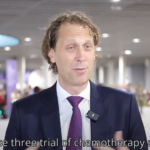
Immunotherapy for advanced liver cancer has advanced rapidly and has become a standard first-line treatment. A HIMALAYA study presented at the 2024 European Society for Medical Oncology (ESMO) Congress (September 13-17, Barcelona) evaluated the new immunotherapy combination STRIDE—tremelimumab and durvalumab compared with sorafenib. Dr. Lorenza Rimassa, the Principal Investigator from Humanitas University in Italy, was interviewed by us on site.947MO – Five-year overall survival (OS) and OS by tumour response measures from the phase III HIMALAYA study of tremelimumab plus durvalumab in unresectable hepatocellular carcinoma (uHCC)
Oncology Frontier:Congratulations! Your poster has been selected as an oral presentation for this ESMO conference. Can you introduce the background and main results of your study to us?
Dr Rimassa: Thank you for the question. This study is the updated overall survival analysis from the HIMALAYA study. The HIMALAYA study is a phase III study in patients with unresectable HCC testing a new immunotherapy combination called STRIDE – a single priming dose of tremelimumab followed by durvalumab – versus sorafenib. The trial also included a durvalumab single agent arm tested for non-inferiority versus sorafenib. The trial is positive and already published, and the STRIDE regimen is already in clinical practice in several countries. The data presented today are the five-year overall survival analysis. In this analysis, we showed that 19.7% of the patients are alive at five years, versus 9.4% in the sorafenib arm. HIMALAYA is the first and only phase III trial in advanced HCC with overall survival data at five years. These data are unprecedented with one-in-five patients alive at five years – something that we have not seen before in patients with unresectable HCC. The other important point of this analysis is that an objective response is not needed to achieve long-term survival, so patients with stable disease may also achieve long-term survival. If we consider patients with disease control (DC), 28.7% of them are alive at five years. Another important point is that the safety profile did not change over time, and no new serious treatment-related adverse events were observed in this analysis.
Oncology Frontier:What do you think is the clinical significance for patients with advanced liver cancer?
Dr Rimassa: These data are really important for clinical practice. We are discussing it with our colleagues, because it is the first time that a phase III trial has reported five-year overall survival. Historically, five-year overall survival of patients with unresectable HCC was <5%, and with the tyrosine kinase inhibitors <10%. Now we have almost 20% of patients have survived to five years, so this is an important point we have to consider in clinical practice when we select our first-line treatment for our patients.
Oncology Frontier:What is the clinical progress of immunotherapy for liver cancer?
Dr Rimassa: In recent years, we have had some phase III trials showing the benefits of different immunotherapy combinations or immunotherapy as a single agent for patients with advanced or unresectable HCC. We have two combinations that are already in clinical practice in several countries – atezolizumab plus bevacizumab, and durvalumab and tremelimumab according to the STRIDE regimen. We also have another combination, camrelizumab plus rivoceranib, now approved in China, but not yet approved in other countries. And we have data for ipilimumab plus nivolumab that are positive as well that were presented at ASCO and here at ESMO 2024, but this combination is not yet approved and not yet in clinical practice. I will also mention some single agents, like atezolizumab or durvalumab single agents, that are approved in some countries for patients with unresectable HCC in the first-line. So we have different options in first-line. There are ongoing trials testing other immunotherapy combinations – dual immunotherapy as well as triple immunotherapy combinations – in first-line. We need to identify which is the best treatment for every patient, and what is the best sequence, because we don’t have solid data in the following lines. But for patients with unresectable HCC, the treatment options have changed completely in recent years with immunotherapy combinations as first-line standard-of-care.


